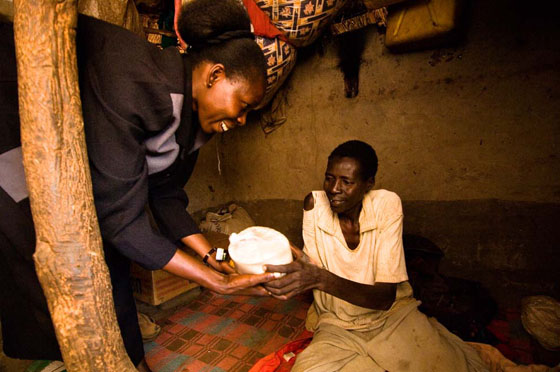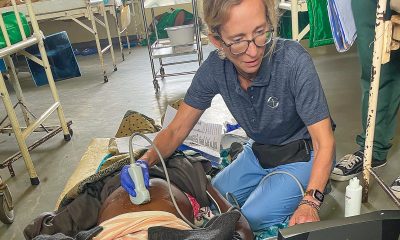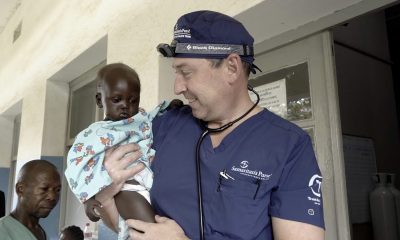In an editorial written for the Washington Post, Franklin Graham says Jesus is the model for how the church should respond to HIV/AIDS
In many ways today, HIV/AIDS has the same stigmas as leprosy did in Bible times. Leprosy was considered a death sentence. Victims were considered unclean and shunned by their families and communities. Yet, Jesus reached out to them, touched them, loved them, and healed them. This is the perfect representation of how the church should respond to people living with HIV/AIDS.
Samaritan’s Purse, the organization I have the privilege of leading, has been helping victims of this deadly virus since the 1980s. In 2002 in Washington, D.C., we organized an unprecedented global conference on the Christian response to HIV/AIDS. Much like this week’s AIDS 2012 conference in Washington, we brought together Christian leaders, political leaders, medical researchers and grassroots workers from 87 countries to discuss the issue and hear from people whose lives had been devastated by HIV/AIDS.
One of our speakers was Sen. Jesse Helms. I remember when he first called me to talk about AIDS, he felt that it was a homosexual disease and that federal money should not be used to help those who were infected. I pointed him to Scripture where Jesus was always full of compassion, even if a person’s sin had caused their circumstances. Instead of asking the sinner what he did wrong, Jesus as the Son of God, used his power to heal their bodies—telling the person to go and sin no more.
Senator Helms soon reversed his position. At our conference, he said, “I think it’s about time that I made a confession that I’ve been too lax too long in doing something really significant about AIDS. It’s been the kind of thing you can lay aside in your agenda. But I tell you, I’m not going to lay it aside on my agenda for the remaining months that I have in the United States Senate. You can’t avoid the seriousness of AIDS or HIV, whether it is in Africa or the United States. The treachery is the same. And the treachery is ignoring it.” Senator Helms became a strong, compassionate voice in the fight against the spread of HIV, and he was committed to getting federal funding to help those suffering from AIDS.
Unfortunately, there is still no cure for HIV/AIDS. But researchers have developed antiretroviral medications that can suppress the virus to the point where victims can now add years to their lives. It’s important that we make that help available to as many people as possible.
As the United States, United Nations and other organizations invest billions of dollars in the fight against HIV/AIDS, it’s crucial that they work with churches and faith-based organizations. In much of the developing world and particularly in sub-Saharan Africa, no other institution has more influence than the local church. Former President George W. Bush recognized this, and I am glad to see that he is a keynote speaker at AIDS 2012. The President’s Emergency Plan for AIDS Relief (PEPFAR), launched in 2003, was a landmark in the international response to AIDS—not only because of the unprecedented funding, but also because it involved faith-based organizations in the grass-roots implementation of programs. Starting with PEPFAR, Samaritan’s Purse has reached 1.25 million people with information on how to prevent the spread of HIV. We’ve also provided 200,000 with HIV testing and counseling.
We need an army of young Christians who are willing to go to the remote areas in this world and show compassion and God’s love. We need to tell those suffering that no matter what they have done in life, God still loves them and He will forgive them. Like Senator Helms said, the treachery is in ignoring it.
It is vital that churches and the Christian community continue to work together to inform people of the truth about how HIV spreads. Education about abstinence and marital faithfulness has proven to be extremely effective. For example, a two-year study by Johns Hopkins University of Samaritan’s Purse HIV/AIDS programs in Mozambique found that abstinence among young females rose from 34 to 49 percent after they received information about how HIV/AIDS is contracted. Every percentage point represents many young women who have made positive decisions to avoid behavior that could put them at risk of HIV.
I am not an advocate of passing out condoms to fight the spread of HIV/AIDS. We should not condone sex outside of marriage. When a crowd dragged the adulterous woman in front of Jesus and prepared to stone her, Jesus forgave her and said, “Go and sin no more” (John 8:11). I cannot imagine Jesus giving her a condom and saying, “Keep doing what you are doing and try to protect yourself.”
We have to take responsibility for our lives and the decisions we make. That starts with the facts. And the fact is any type of sexual relationship outside a committed marriage between one woman and one man puts you at risk for contracting the virus.
Unfortunately, millions won’t be faithful to their spouses or accept God’s standards and will put themselves at risk just for a moment of pleasure. Christians are called to live by a higher standard. Like Jesus, we have to warn those who are putting themselves at risk and have compassion for those who are infected.








